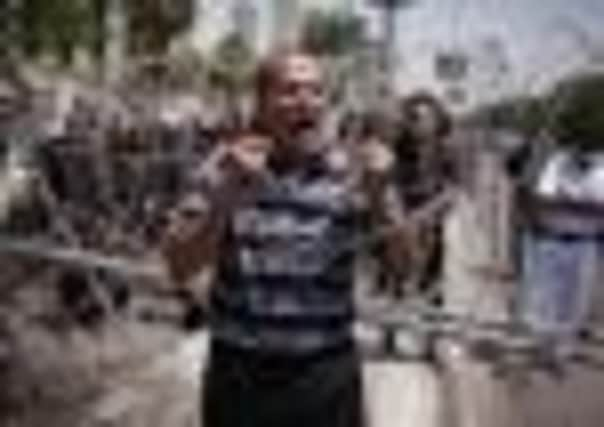Dissolution of parliament pushes Egypt to the brink


Islamist politicians who had gained most from his overthrow decried what they called a “coup” by an army-led establishment packed with Mubarak-era officials. Outside the constitutional court, protesters chanted “Down, down with military rule” and hurled stones at troops lined up in a security cordon.
Parliamentary elections earlier this year swept Islamists into a commanding position, a feat the Muslim Brotherhood aimed to repeat with their candidate in Saturday and Sunday’s presidential vote. Those parliamentary gains will now be put back up for election.
Advertisement
Hide AdAdvertisement
Hide AdIn a further setback for the Islamists, the Supreme Constitutional Court ruled that Mubarak’s last prime minister, Ahmed Shafiq, could stay in the presidential race against the Brotherhood’s Mohammed Morsi. Mubarak himself is in prison, having been found guilty of ordering a clampdown which led to the deaths of protesters.
Mr Shafiq, a former military man appointed premier in the last days of Mubarak’s rule, hailed the rulings as “historic”.
“The ruling rincludes the dissolution of the lower house of parliament in its entirety,” the head of the constitutional court, Farouk Soltan, said. A new election will have to be called by the executive powers, he said.
The court had earlier overturned a law passed by the Islamist-led parliament that would have blocked senior Mubarak-era officials from the presidential race, aimed to keep Mr Shafiq and others out.
A senior member of the Brotherhood’s political party, which holds the biggest bloc of seats in parliament, said Egypt was entering a “dark tunnel” if parliament was dissolved.
“Keeping the military candidate and overturning the elected parliament after granting the military police the right to arrest is a complete coup,” said moderate Islamist, Abdel-Moneim Abolfotoh.
He was referring to a decree issued on Wednesday allowing military police to detain civilians, a move critics said was a barely disguised bid to reinstate the decades-old emergency law that ended on 31 May.
“Whoever thinks that millions of youth will let it pass is deluding themselves,” Mr Abolfotoh said of the rulings.
Advertisement
Hide AdAdvertisement
Hide AdFor activists, the measures add to their suspicions that the pillars of Mubarak’s establishment such as the army and police are regrouping to challenge the fragile political gains made 16 months after Mubarak was overthrown. Liberal politician Mohamed ElBaradei, a former head of the United Nations nuclear agency, warned: “The election of a president in the absence of a constitution and a parliament is the election of a president with powers that not even the most entrenched dictatorships have known.”
The protesters outside the court demanded that the judges block the presidential bid by Mr Shafiq, a man they derisively call a member of the “feloul”, or a remnants of Mubarak’s regime.
But at a hotel a few miles away on the outskirts of Cairo, Mr Shafiq addressed hundreds of ecstatic supporters, who danced and chanted: “The army and the people are in one hand.”
“The message of this historic verdict is that the era of political score settling has ended,” he told them, pledging to end chaos and restore stability.